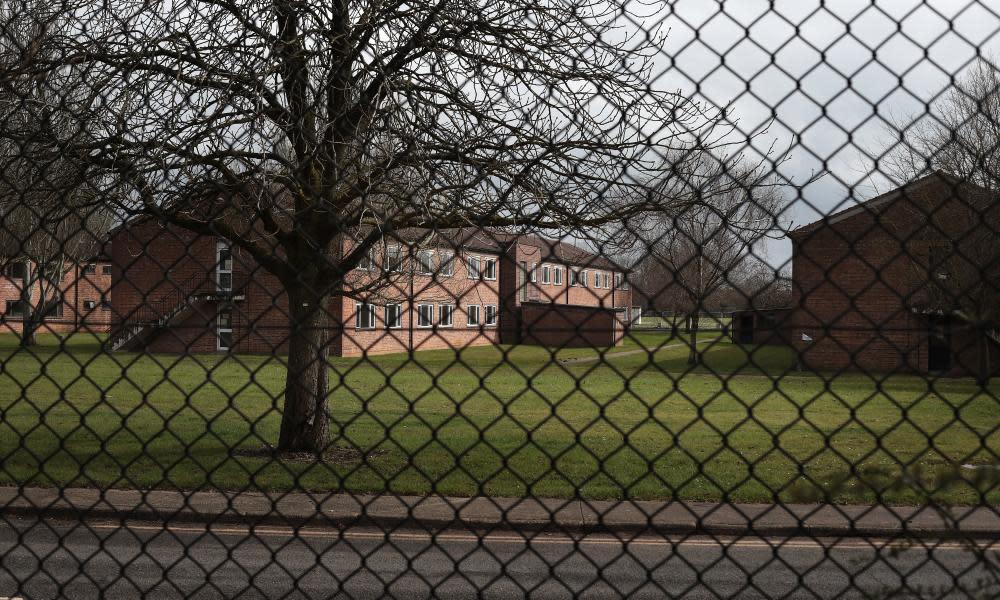Tories split over sites for refugee housing and deadline for stopping small boats

The government has pledged to move asylum seekers into disused military bases with the minimum living conditions allowed under international law, but has come under pressure from ministers whose constituencies would host the camps.
Rebel Conservative backbenchers warned that they expected Rishi Sunak’s pledge to stop small boat crossings to be fulfilled by the end of the year, a timetable rejected by Downing Street and one that could potentially lead to an internal split.
Announcing the plan to stop housing asylum seekers in hotels while their claims are processed, Robert Jenrick, the immigration minister, said the UK could stop incentives to cross the Channel only by being as ruthless as the people smugglers.
“They are some of the most evil, most pernicious people in society. You have to match them – you cannot behave in a way that is weak and naive,” he told MPs.
The asylum seeker camps would meet international legal requirements to ensure that those who arrived were not made destitute, Jenrick said, with shelter in “repurposed barrack blocks and Portakabins” and basic medical care, but nothing that could act as “a magnet” for displaced people.
“Accommodation for migrants should meet their essential living needs and nothing more,” Jenrick said. “We must not elevate the wellbeing of illegal migrants above those of the British people.”
The plan, involving the use at least three former bases, prompted immediate condemnation from campaign groups, with the Refugee Council saying they were unworkable and “not who we are as a country”.
It also remains to be seen how effective the policy will be, with the planned accommodation on disused bases, totalling 4,900 spots, amounting to less than a tenth of the 51,000 people currently housed in hotels.
Another complication is that two of the three planned bases are in the constituencies of government ministers, both of whom have expressed displeasure at the plans, while the third faces a legal challenge from the council, supported by the local Conservative MP.
Under the plans, up to 1,700 people would be eventually housed at a disused defence site at Wethersfield in Essex; 2,000 more at a former RAF base at Scampton in Lincolnshire; and 1,200 at an RAF site turned prison in Bexhill, East Sussex.
James Cleverly has previously spoken out against the use of the Wethersfield site, in his Braintree constituency. In a statement on Wednesday, the foreign secretary said he had been given assurances about local safety, but said the decision “isn’t the result my constituents and I wanted”.
Huw Merriman, the rail minister, also expressed concern about the choice of the Northeye site at Bexhill, in his constituency, saying this would be “of great concern to local residents”.
Edward Leigh, the Tory MP whose Gainsborough constituency contains RAF Scampton, which was the base for the Dambusters bomber squadron in the second world war, said the council would seek an injunction to stop it being used.
In a separate internal row, Tory rebels who threatened earlier this week to push through amendments to the illegal migration bill, which pledges to deport and permanently bar from the UK anyone who arrives unofficially, reiterated their push for rapid action.
A spokesperson for the rebels, who dropped their amendments after ministers assured them they would remove more legal safeguards for asylum seekers, said they understood Sunak’s pledge to stop small boats, in a speech in January setting out five policy pledges, to mean this would happen during 2023.
“We understood the speech was crystal clear that we are going to stop the boats by the end of the year,” the spokesperson said. “Stop the boats, halve inflation, grow the economy – these were all promises to be fulfilled by the end of the year.”
However, Downing Street said on Wednesday that this was not the case. The prime minister’s spokesperson said: “We haven’t set a deadline for it. We recognise that it’s a complex problem, and obviously some of the elements that we believe will solve it are subject to judicial challenge.”
Sunak dwelt on the issue at length in his January speech, but the ambiguity of his promise has caused problems for Downing Street since.
The prime minister said at the time: “We will halve inflation, grow the economy, reduce debt, cut waiting lists and stop the boats. Those are the people’s priorities, they are your government’s priorities, and we will either have achieved them or not.”
The impasse threatens a renewal of hostilities with Tory rebels, reported to number up to 60, who were persuaded to back down after ministers and Downing Street officials assured them their concerns would be reflected in later versions of the migration bill.
The rebel MPs, led by the Devizes MP Danny Kruger, were due to hold talks with the government over the Easter recess, which begins on Thursday.
Even as it stands, the illegal migration bill has been roundly condemned by rights groups and refugee charities. On Wednesday, the Council of Europe’s group of experts on action against trafficking in human beings (Greta) took the highly unusual step of expressing concern about the bill and its lack of compliance with core elements of the council’s convention on action against trafficking in human beings.
The planned law, which would not usually allow asylum seekers to avoid deportation even if they were trafficked or slaves, is a “significant step backwards” in the fight against human trafficking and modern slavery, the group said.

 Yahoo News
Yahoo News 
